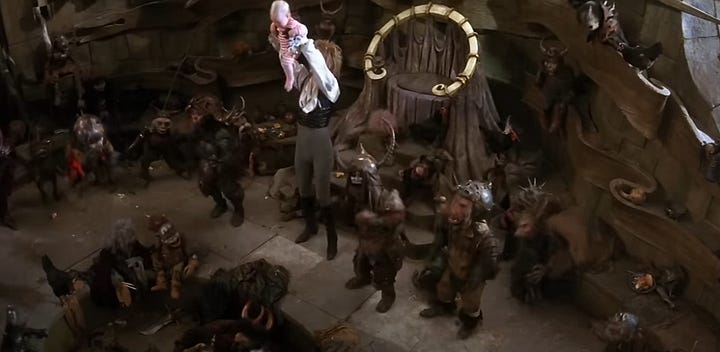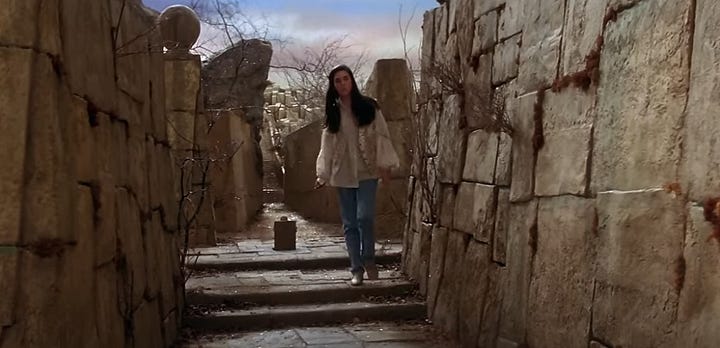In the wake of death and loss, particularly sudden or traumatic deaths, it's hard to imagine ever feeling grateful for the intensely painful experience. The stories you told yourself about your future are no longer true, as the narrative arc of your life collapses before your very eyes.
No, I will never be grateful for the traumatic experience of losing my firstborn to stillbirth, or the sudden, silent deaths of both my Grandparents. Not for the loss of our family menagerie, nor the vivacious personalities I have seen taken too soon.
You are left with unanswerable questions, and the reality of a world without them is overwhelming. You imagine yourself trapped in a labyrinth of loss and desperation forevermore.
I will never be grateful for those losses, but I can find gratitude for grief itself.
Coming to this place of acceptance and gratitude is like finding yourself at the centre of this labyrinth. You survey the various snags, snares, twists, and turns you took to get here. You're not grateful for being trapped in the labyrinth – you were quite happy living life on the outskirts of grief – but you're here now nonetheless, and you've learned a thing or two about resilience.
(I wish my labyrinth was the 1986 whimsical-worms-and-too-much-crotch-David-Bowie Labyrinth, because Sarah gets the baby back at the end, but I do not).


The Fourth Wall of Our Lives
I learned a fancy new word yesterday: Metalepsis.
Metalepsis is a rhetorical device (basically a storytelling technique) that transgresses the boundaries between narrative levels in fiction. This happens when a narrator enters their own story, or when a character addresses the narrator.
Metaleptic transgressions feel surprising, playful, paradoxical or destabilizing, and often very surreal.
Some good examples are when a film character "breaks the fourth wall" by directly addressing the audience, or when the film shows the actor walking into the set – the characters move "up" a narrative level. When the audience or narrator enters the story, they move "down" a narrative level.
Given my current preoccupation with grief and resilience, I cannot help but wonder: what if grief itself is a metaleptic event in our lives? What if loss forces us to break through the fourth wall of our own carefully constructed narratives?
When Death Rewrites the Script
Narrative therapy has been quite successful in helping many who struggle with grief to find new meaning amidst the rubble of their lives. While formal narrative therapy takes place within the consulting room, we often utilize narrative revisioning in everyday life – affirmations, positive thinking, morning pages, writing letters to our future selves, and persistently refuting that relentless, snarky little voice in our head that says "you're not good enough."
A therapist once said that worrying about whether your thoughts are negative or positive is essentially useless. Instead, we should be asking "is this thought helpful in any way?"
The beauty of narrative therapy is that it allows us to suspend our inexorable sense of the linearity of our life's plot and consider our story along multiple new lines of "becoming."
A wonderfully simple yet powerful example of this shift in thinking comes from The Crafting of Grief. The authors invite us to consider two questions, the first of which is: "Who am I?"
Spend a moment here. Ponder a while.
It's difficult to answer. How can we squeeze the vast continuum of experiences and paradoxical parts of ourselves into something so pithy as an "I am" statement?
Now, ask yourself, "Who am I becoming?"
This is much more interesting.
No longer constrained by material "fact," we open the door to possibility. Many of us skip through the doors of becoming: devouring books, articles, courses, upskilling, fantasizing. Many of us are happy to peer through the door of becoming from a safe distance, content just "being" with our lot, and that's a perfectly beautiful life.
In grief, however, we are winded, hogtied, and dragged through that damn door.
Narrative therapy is at least kind enough to rip the blindfold off after door number one, revealing that there is a multiplicity of doors – and you can pick more than one.
This agency is one of the great gifts of grief.
The Neuroplasticity of Loss
What happens in our brains when grief forces us through this narrative shift?
Dr. Mary-Frances O'Connor, world renowned expert in grief psychology and physiology, describes in The Grieving Brain how grief is actually a process of learning an entirely new way of being. The brain has to work incredibly hard to re-author the story.
Grief changes the rules of the game, rules that you thought you knew and had been using until this point. ~ Page 209, The Grieving Brain
This connects directly to neuroplasticity – the degree to which the brain creates new neural connections. We experience high neuroplasticity at key life transitions: birth to age three, adolescence, and becoming parents. Grief, it turns out, is another such window of profound neural reorganization.
Greer Kirschenbaum observes in The Nurture Revolution that women who have birthed stillborn babies are unique in that we really don't know much about the "double-whammy" neuroplastic effects of matrescence and grief.
When we experience pregnancy loss or infant loss, our brains have undergone some or all of the profound changes towards being parents … We don’t have any research on this brain state. We don’t have a word to define it. ~ Page 57, The Nurture Revolution
When we experience loss, our brains must reconcile the impossible: the continued existence of our love alongside the physical absence of its object. This cognitive dissonance forces new neural pathways to form, and new understandings to emerge.
Purely Coincidental, or Purely Transcendental?
Sometime after my Nana Karen died in May 2018, I remember one particular evening quite vividly.
I was exhausted after a long day in the office and the soul-wrenching commute through Cork City. I sank into the faux-leather sofa in our "kittingroom" (sitting room and kitchen combined, my genius knows no bounds) for "just five minutes," listening to the ethereal, soothing synth-waves droning from the bedroom. I very swiftly drifted to that middling place where you might wake just enough to hear your thoughts slipping into the well of illogical wonder.
"I LOVE YOU" — "Ahhhhhhh what the fuck?!"
Nana had just whispered in my ear, loudly. I swear I could feel her breath rustle the eustachian hairs of my left canal.
Nana was a quiet woman, but highly critical whenever she did speak. Her American twang added to her tone of condescension. She was truly a Karen.
Still, she showed love in the ways she knew how – practical matters: purchasing stationery, white goods, clothing, feeding you and then feeding you some more.
She had a two-week turnaround from diagnosis to death, and I never got to say goodbye properly. For her to potentially bend time and space to deliver that final message was really rather thoughtful.
Grandad Joe died nine months to the day after Nana, without even the foggiest intimation of impending death, the bastard. (Believe me, he would chuckle at my irreverence.)
I never got to say goodbye, again.
I was devastated beyond words. We genuinely thought he would live forever as he'd been "dying" since 1998. He was artistic, deeply philosophical, and tormented by the gravitas of his own spiritual quandaries.
If either of them were going to transcend the ethereal barrier to materiality to leave me a message, my bets would have been on him – but nope, nothing, at least for six years.
A couple of weeks ago I was rambling through a field – the ones with the craggy walls under the giant skies out West. As I meandered through the rushes, I returned to my most cherished childhood memories with Grandad.
A poem took root in my psyche, and I directly addressed my Grandad for the first time in a very long time through its verses... I thought it best to wander home and jot it down while it was still fresh.
Once in the door, I picked up my phone – a message from a friend: "I had a dream about Joe last night. He told me to tell you he loves you."
Purely coincidental, or purely transcendental?
Finding Gratitude in the Narrative Shift
Death is The Metaleptic Event – the ultimate event horizon. It's the final fourth wall that we encounter in life, the final door of becoming.
But what if these narrative disruptions – painful as they are – create openings for profound growth?
Resilience in grief means:
Adaptive thinking in response to changing, challenging circumstances
Understanding your emotions and holding space for them
Having belief in your ability to overcome difficulties
Remaining hopeful for the future
I've come to understand that grief's metaleptic nature – the way it forces us to confront the constructedness of our life narratives – offers transformative gifts:
Heightened awareness of how precious life truly is
Greater capacity for compassion (for self and others)
Permission to rewrite narratives that no longer serve us
Deeper connection to what truly matters
You don't need to be grateful for your losses. The pain is real and valid. But perhaps there's room to appreciate how grief's metaleptic disruption opens doors to becoming someone new – someone who carries both the weight of loss and the wisdom it reluctantly bestows.
We are all, in our own ways, finding ourselves at the centre of labyrinths we never asked to enter. But in that centre, we might discover that the walls were never as solid as they seemed.
To my Bluequential Creative Grieving Club community,
Your presence here means so much to me on our journeys through creativity and grief. Every time you read, comment, or share these words, you validate that creative grieving is a possibility for us all. Your support allows me to continue researching, writing, and creating resources that honour our losses while nurturing our resilience.
If it resonates, consider a small donation to the Coffee Cash using the button below - it keeps the words flowing while I’m nap-trapped with my little one!
Thank you for believing in this work.
Sarah-Liz & Blue








